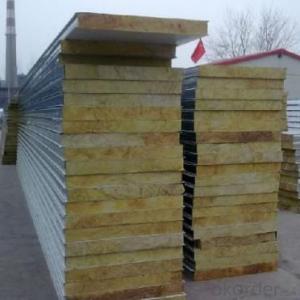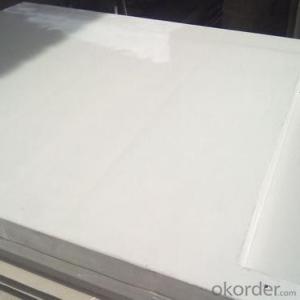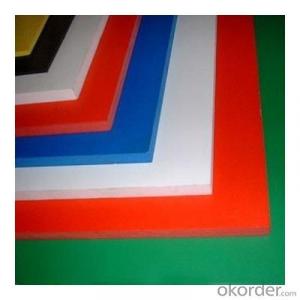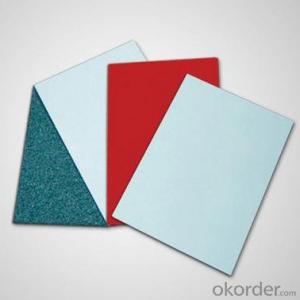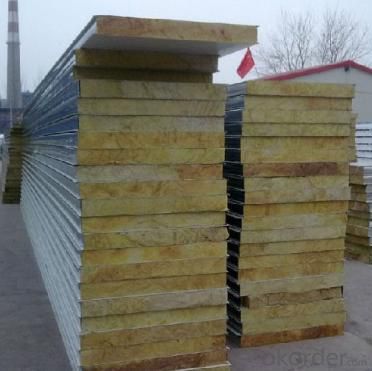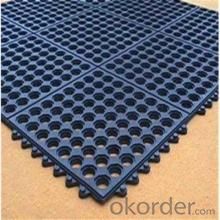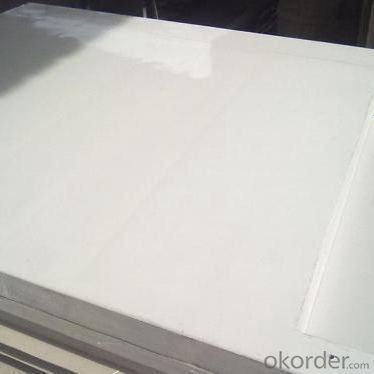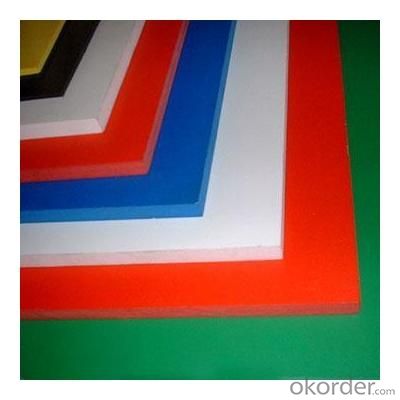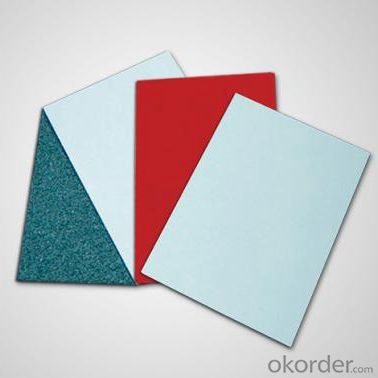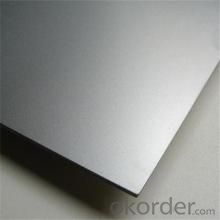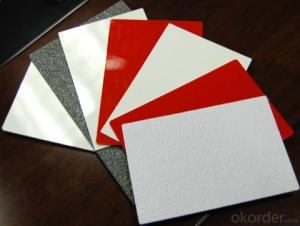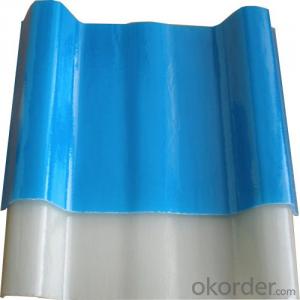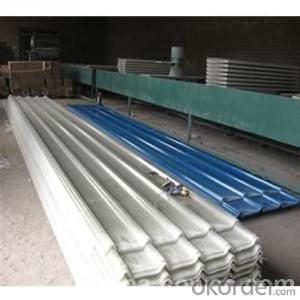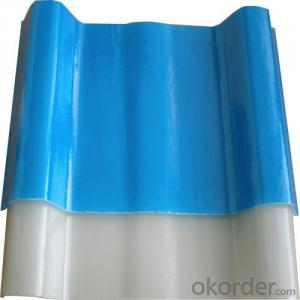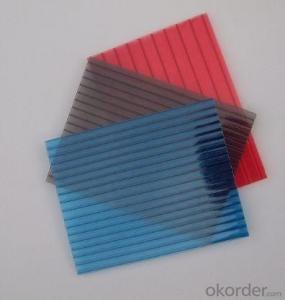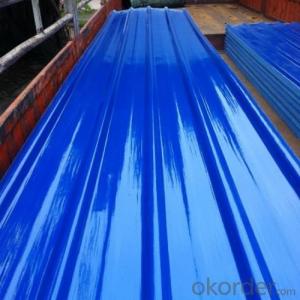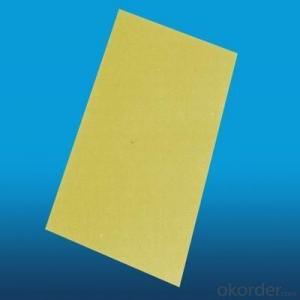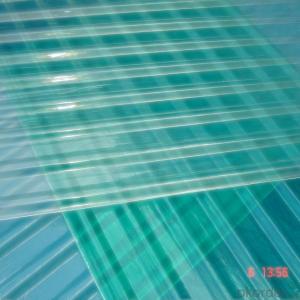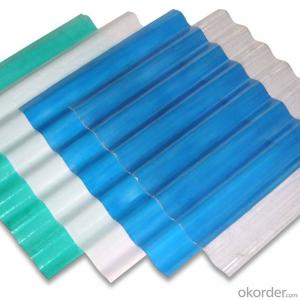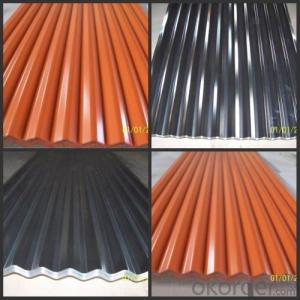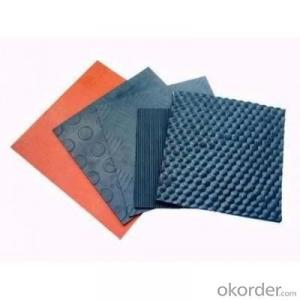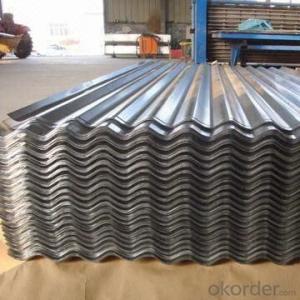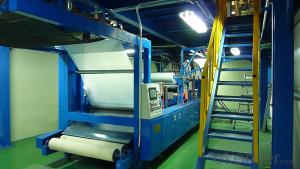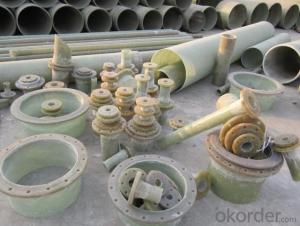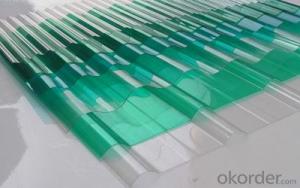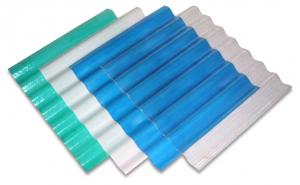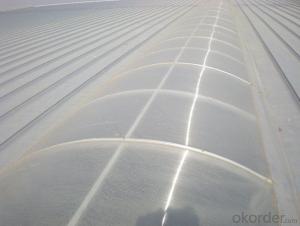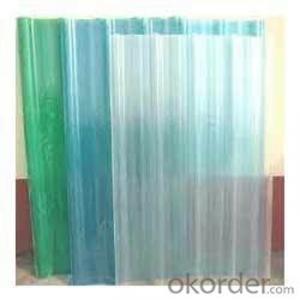FRP Roofing Panel - Custom Design FRP Corrugated Semi-Transparent Roof
- Loading Port:
- Tianjin
- Payment Terms:
- TT OR LC
- Min Order Qty:
- 300 m
- Supply Capability:
- 60000 m/month
OKorder Service Pledge
OKorder Financial Service
You Might Also Like
Specification
PRODUCT DESCRIPTION
equipment is FRP continuous molding machine, unit mix of resin, fiber Wall to Wall thickness control, process regulation, curing, cutting, cleaning consisting of several parts. The production capacity can reach 2,500 meters. The accuracy of the equipment reached the advanced level, while the advanced production technology to ensure product quality and stability.
FEATURES
1.Light transmission rate of 80%
2.Anti-aging
3.good corrosion resistance
4.excellent toughness
5.used in -60°c to 100 °c
6.Thickness:0.8-2.5mm
7.length:Customized
8.Excellent water resistance
9.Impact resistance
SPECIFICATIONS
| Name: | Custom Design FRP Corrugated Semi-Transparent Roof |
| Material: | Protective film, Unsaturated resin polyester, Fiberglass |
| Weight: | 1800g/2400g/2750g/3050g Square meter |
| Thickness: | 0.8~3.0mm |
| Length: | Customized |
| Temp: | used in -40°c to 140 °c |
| OEM: | Welcomed |
| Color: | Clear/Blue |
PICTURES
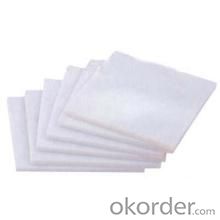
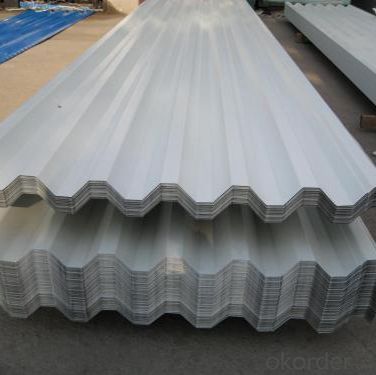
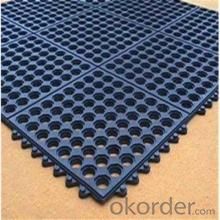
- Q: Can FRP roofing panels be installed on wooden structures?
- FRP roofing panels can indeed be mounted onto wooden structures. Their lightweight nature allows for easy installation on different surfaces, including wood. The crucial aspect to consider during the installation of FRP panels on wooden structures is to ensure a proper installation process. This involves confirming that the wooden structure is in good condition, devoid of any decay or harm, and providing adequate support for the panels. It is also imperative to adhere to the manufacturer's installation guidelines and recommendations to achieve a secure and long-lasting outcome. In summary, by implementing appropriate installation techniques, FRP roofing panels can be effectively affixed onto wooden structures, creating a resilient and weather-resistant roofing solution.
- Q: Do FRP roofing panels have good sound insulation properties?
- FRP (Fiberglass Reinforced Plastic) roofing panels generally do not have good sound insulation properties. While they do provide some level of sound reduction, they are not specifically designed for soundproofing purposes. The main function of FRP roofing panels is to provide a durable and weather-resistant covering for buildings and structures. Sound insulation primarily depends on the thickness and density of the material used. FRP panels are relatively thin and lightweight, which means they have limited ability to block or absorb sound waves. Additionally, the smooth surface of FRP panels tends to reflect sound rather than absorb it. This can lead to echo and reverberation in enclosed spaces, contributing to a louder and less acoustically pleasing environment. If sound insulation is a critical requirement for your project, it would be advisable to consider alternative roofing materials specifically designed for soundproofing, such as acoustic panels or specially engineered soundproofing membranes. These materials typically have higher density and are designed to absorb or block sound waves effectively, providing better sound insulation properties.
- Q: Can FRP roofing panels be used for car washes?
- Yes, FRP (Fiberglass Reinforced Plastic) roofing panels can be used for car washes. FRP panels are commonly used in industrial and commercial settings, including car washes, due to their durability, strength, and resistance to various chemicals and weather conditions. These panels are known for their ability to withstand moisture, UV rays, and extreme temperatures, making them ideal for car wash environments where they are constantly exposed to water, cleaning solutions, and sunlight. Additionally, FRP panels are lightweight, easy to install, and require minimal maintenance, which further enhances their suitability for car wash applications.
- Q: Can FRP roofing panels be used in curved or complex roof designs?
- Indeed, curved or complex roof designs can utilize FRP (Fiberglass Reinforced Plastic) roofing panels. These panels possess flexibility and versatility, which render them suitable for diverse architectural designs. Molding and shaping these panels to fit curved or complex roof structures is effortless, enabling the creation of distinctive and visually captivating designs. Furthermore, FRP roofing panels boast exceptional durability, weather resistance, and UV protection, guaranteeing a reliable and enduring choice for any roofing project, even those with curved or complex designs.
- Q: Can FRP roofing panels be used in concert venues or stadiums?
- Certainly! FRP roofing panels have the capability to be utilized in concert venues or stadiums. Renowned for their durability, strength, and versatility, FRP roofing panels are applicable in a wide range of settings, including expansive locations like concert halls and stadiums. FRP panels possess a lightweight yet sturdy nature, rendering them an optimal solution for roofing in these types of constructions. They demonstrate the capacity to withstand substantial weights and are resistant to impact, allowing them to endure the vibrations and movements frequently associated with large crowds and events. Furthermore, FRP roofing panels exhibit high resistance to various weather conditions. They can endure extreme temperatures, UV radiation, and harsh weather elements, making them suitable for outdoor implementation in stadiums and concert venues. Another advantage of FRP panels lies in their ability to facilitate excellent light transmission. This attribute enables natural light to penetrate the roofing, reducing the reliance on artificial lighting during daytime events and cultivating a more pleasant ambiance for attendees. In addition, FRP roofing panels can be tailored to meet the specific requirements of concert venues or stadiums. They are accessible in a variety of colors, finishes, and profiles, enabling architects and designers to fashion visually appealing and aesthetically pleasing structures. In summary, FRP roofing panels are indeed a viable choice for concert venues or stadiums. Their durability, strength, weather resistance, and capacity for natural light transmission make them a suitable and pragmatic option for these grand-scale constructions.
- Q: Are FRP roofing panels suitable for commercial applications?
- FRP roofing panels are well-suited for commercial use. They are a popular choice for commercial buildings because of the many advantages they offer. Firstly, they are lightweight and durable, making them able to withstand harsh weather and heavy loads without compromising their structure. This makes them perfect for commercial buildings that require durability. Furthermore, FRP roofing panels are resistant to UV rays, corrosion, and chemicals, making them ideal for commercial applications where exposure to these elements is common. Their resistance also means that they require minimal maintenance, which lowers long-term costs for commercial building owners. Moreover, FRP roofing panels have excellent insulation properties, which helps with energy efficiency and reduces heating and cooling expenses for commercial buildings. This is particularly beneficial for commercial applications that require climate control in large areas. Finally, FRP roofing panels offer design flexibility, as they come in various colors, textures, and profiles. This allows commercial building owners to select a roofing system that meets their aesthetic preferences while still providing the necessary functionality. In conclusion, FRP roofing panels are an outstanding choice for commercial applications because of their durability, resistance to UV rays and chemicals, energy efficiency, low maintenance requirements, and design flexibility.
- Q: Are FRP roofing panels prone to scratches?
- FRP (Fiberglass Reinforced Plastic) roofing panels are generally durable and resistant to scratches. However, like any surface, they can still be prone to scratches if not handled and maintained properly. The level of scratch resistance may vary depending on the specific brand and quality of the FRP panels. In most cases, FRP roofing panels are designed to have a protective gel coat layer that helps prevent scratches and other surface damage. This gel coat acts as a barrier and enhances the durability of the panels, making them less susceptible to scratches. Nevertheless, it is important to handle FRP panels with care to minimize the risk of scratches. Avoid dragging or sliding heavy objects across the surface, as this can potentially cause scratches. Additionally, using abrasive cleaning materials or harsh chemicals on the panels can also lead to scratches or damage to the gel coat layer. Regular maintenance, such as cleaning the panels with a mild detergent and soft cloth or sponge, can help preserve the appearance and integrity of the FRP roofing panels. It is also recommended to inspect the panels periodically and address any scratches or damages as soon as they are noticed, to prevent further deterioration. Overall, while FRP roofing panels are generally resistant to scratches, proper handling and maintenance are essential to ensure their longevity and appearance.
- Q: Are FRP roofing panels suitable for high-humidity environments?
- FRP roofing panels are highly suitable for high-humidity environments. They are moisture-resistant, durable, and have excellent corrosion resistance properties, making them ideal for areas with high humidity levels. These panels can effectively withstand the effects of moisture, preventing warping, rotting, or degradation typically associated with traditional roofing materials in such conditions.
- Q: Can FRP roofing panels be used in areas with high winds?
- Yes, FRP roofing panels can be used in areas with high winds. FRP (Fiberglass Reinforced Plastic) roofing panels are known for their durability and strength, making them suitable for withstanding strong winds. However, it is important to ensure that the panels are properly installed and secured to prevent any potential damage or displacement during high wind conditions.
- Q: Which is better, glass fiber reinforced plastic daylighting board and organic glass?
- Glass panels are lighter and easier to fix
Send your message to us
FRP Roofing Panel - Custom Design FRP Corrugated Semi-Transparent Roof
- Loading Port:
- Tianjin
- Payment Terms:
- TT OR LC
- Min Order Qty:
- 300 m
- Supply Capability:
- 60000 m/month
OKorder Service Pledge
OKorder Financial Service
Similar products
Hot products
Hot Searches
Related keywords
